|
Empathy Cafe Newsletter
Building a Culture of Empathy
and Compassion |
 |
|
I want us to organize, to tell the
personal stories that create empathy, which is the most
revolutionary emotion. Gloria Steinem
|
|
March 10, 2010 Vol
1, Issue 3 |
|
 |
|
Audacity of Hope
|
|
I am obligated to try to see the world
through George Bush’s eyes, no matter how much I may disagree with him.
That’s what empathy does - it calls us all to task, the conservative and the
liberal, the powerful and the powerless, the oppressed and the oppressor. We
are all shaken out of our complacency. We are all forced beyond our limited
vision. Barack Obama, Audacity of Hope
|
|
|
 |
|
Speech to Congress |
|
That large-heartedness - that concern and regard for the plight of others -
is not a partisan feeling. It's not a Republican or a Democratic feeling.
It, too, is part of the American character - our ability to stand in other
people's shoes; a recognition that we are all in this together, and when
fortune turns against one of us, others are there to lend a helping hand.
Barack Obama, Health
Care Speech to Congress |
|
Editorial
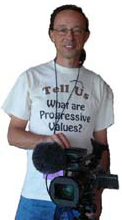 |
Greetings, Friends,
Are you ready to organize and tell the personal stories that build a culture
of empathy, as Gloria calls on us to do? Perhaps it is the mutual
creative story telling and listening to those personal stories that can help
overcome the partisanship that we continuously see in the national media?
This edition of the newsletter has a political
bend, but I promise the next one will be all about the arts. At the
political level, Barack calls on us to listen to all sides. I was gratified
to see him bring Republicans and Democrats together in the national Health
Care Forum. The face-to-face dialog seemed like a positive step, even
if it doesn't bring immediate results, it helps by slowly changing the
typical us versus them dynamics.
The part that was missing for me was more of a discussion about the
underlying values that are at stake. Do we want a health system based
on caring or one based on selfishness and greed? The forum discussions
tended toward the technical policy areas. They could have taken some lessons
from our last Empathy Healthcare Cafe and shared more personal experiences
and stories - which helps in developing a common connection.
By the way, most images in this newsletter
link back to the original video clips. For example, click on the Gloria
Steinem photo above and it will lead you to the original video clip of her
quote. I hope you'll enjoy this newsletter and forward it to friends and
send me feedback.
Warmly,
Edwin
|
Empathy Cafe
 |
Join the Empathy Cafe Planning Meeting
We are now planning the next Empathy Cafe
meetings, the goal being to contribute to Building a Culture of
Empathy and Compassion by producing a series of monthly Empathy Cafes,
consisting of a presentation by an
'empathy expert' speaker, followed by a World Cafe style discussion
forum. This is a way to develop support for empathy in our community by creating a space for personal growth, education, networking,
community organizing and responsible social action. Our last
Empathy Healthcare Cafe generated a lot of positive energy. We need to
keep it growing.
Visit the
meeting page for more details
and join the Online Planning Discussion list. Here's what we need to get started:
First a committed planning team and second a meeting space for at least 100 people.
Anyone know of a good space in or around the Berkeley area? This is the
first hurdle.
I hope you'll join the
organizing team for producing the next Empathy Cafés Series.
|
|
Politics

|
Engaging the
Other: Progressives and
Conservatives

A while back I attended
the
Engaging the
Other - Power of Compassion conference in San Mateo, California and
gave a presentation on a panel about
media images of "The Other" with four panelists. This is the first time I've
been on a panel and we had all of seven attendees. I learned not to be on
the very first panel in the conference since most people haven't arrived by
then or are still waking up.
It was, however, a perfect conference for interviewing people about empathy.
Many of the attendees came from academia, peace and justice groups, dialog
and/or Carl Rogers based psychology traditions, etc.
At the conference, I interviewed Joseph
McCormick who talked about his transformation from being an extreme conservative to
a moderate, i.e.
someone who is
now trying to balance progressive and conservative values. Joseph is one of
the founders of the
Transpartisan Alliance,
an organization that is working to bridge the left - right partisan divide
through dialog.
I hope to do many more interviews with
conservatives on their insights and stories of empathy. I see it as a
discussion the can help bridge the partisan divide. Here are links to
the interview with Joseph.
In clip four, Joseph had some
interesting comments about how it pains him to see progressives judging the judgers.
After experiencing a personal a break down and becoming homeless he was embraced by
'hippies' who helped him reconnect with his feelings. It's a fascinating story.
|
Having myself grown up in a
conservative evangelical house and with my family voting Republican, I
found this interview most insightful. Joseph is quite open and
articulate, and I appreciate him taking the time to share his personal
experiences. Having interviewed mostly progressives, I hear all the
positive aspects of being aware of others feelings.
I don't want to get to Pollyannaish about
empathy, but want to listen to all perspectives about it.
Hearing Josephs story, I can better see why conservatives might be
suspicious of empathy. Feelings and emotions can be manipulated,
seem weak, be dangerous, make you lose your sense of self, lose your
personal boundaries, open yourself to be emotionally taken advantage of,
etc. For example, see this video of
the conservative
Senator Jeff Sessions skeptically asking: "What is empathy?".
These are all important questions to be answered. |
|

Jeff
Sessions |
Some additional thoughts on the dangers.
|
|

Kirk Schneider |
|
Kirk J. Schneider
is an author, psychologist and leading spokesperson
for contemporary humanistic psychology.
He told me empathy can be seen as dangerous and that's why it's avoided in
society. It leads to intimacy and
intimacy is scary for many. There's also the terror of somebody going into an
emotional space they would rather avoid. The South African Truth and
Reconciliation Commission is a recent example of just that. Most societies want
to just sweep past traumas and pain under the rug and not hear or relive
the pain and suffering
of what has happened in the past.
In addition,
Kirk says, there's the fear of losing contact
with what we call reality. It feels dangerous to open yourself up to people who are
tormented and feel like bottomless pits of pain. While acknowledging all
these aspects, Kirk says the rewards of empathy can be deeply moving. |
|
|
|
|
|
|
Senate Debate on
Empathy, Law and Justice
Here are a few more links that relate to the Left - Right
divide.
This page has transcripts and video from the Senate debate on empathy. The debate was
started when Barack Obama said that empathy was one of his criteria for choosing
a Supreme Court Justice. This debate then heated up with the nomination of Sonia
Sotomayor. I've downloaded and organized around 90 video clips and an amazing
three hours of
transcripts from this Senate debate where empathy was mentioned more than 250
times! I still have a lot of work to do on organizing this material. While the debate is
now on a low simmer at the moment, it's sure to
come to a rapid boil again with the next nomination to the Supreme Court. There's
a possibility it could happen again as soon as this summer, since it's
rumored, that the 89 year old
John Paul Stevens
may step down this summer.
|

Joe Brewer |
|
A while back I talked with Joe Brewer, who was working at
George Lakoff's Rockridge Institute Think Tank at the time. He was out
sweeping the streets of Oakland, doing some volunteer community service.
While leaning on his broom,
Joe talked about how
empathy is the foundation of progressive values, such as, caring,
responsibility and community.
As an example of this, California State Senator Loni Hancock
talked with me
about her personal values of empathy and caring.
|
|

Loni Hancock
|
|
Loni tells the story of how, as a little
girl, she felt distraught at seeing the animals caged up at the zoo. Her
caring started early. I actually still feel that way and don't
go to zoos for that reason. |
Stephen Colbert from the Colbert Report replied to conservative concerns in has his
own humorous way. Here he addresses the
Code Word Empathy.
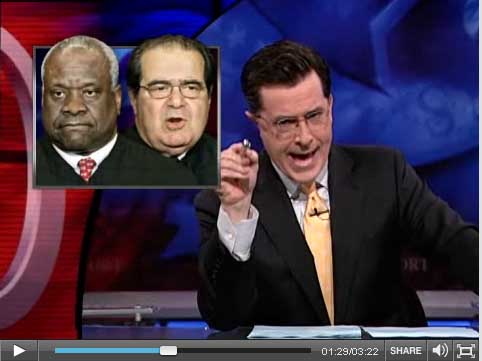
|
The Common Humanity of Liberals and Conservatives |
|
 |
|
Larry Rosen, who is a
marriage therapist and mediator, shared his view of the
differences and similarities between progressives and conservatives. He
feels both sides have the same common humanity, but that
their 'strategies' are different. (Let me translate that from therapist talk
into political language: their 'policies' are different.) He suggests dropping the labels and trying
to connect to our deeper underlying needs, values and common humanity.
This approach seems to work for him in couples therapy. |
This discussion has just begun and will
be with us for many years. A great deal of work still needs to be done
so we can build a Culture of Empathy that bridges the partisan divide. I
hope to interview more people on both sides of the aisle to hear their
stories and find the common ground of our deeper humanity. |
California GOP Convention
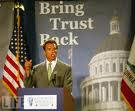 |
Reaching Across the Divide
 |
|
The California State GOP convention is March
12-14th in the San Jose, CA Convention Center. I'll be
going to the convention with video camera in hand to interview
Republicans, conservatives, libertarians, etc. I'll be keeping an
eye out for Arnold Schwarzenegger; - what do you think the terminator
would say about the value of empathy? His wife, Maria Shriver, is a
Democrat, so somehow they do mange to bridge the partisan divide. |
|
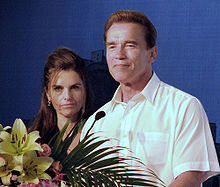 |
What questions would you like me to ask at the convention? |
Empathy Expert
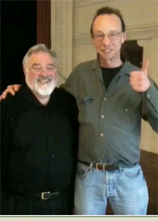
|
|
George Lakoff |
|
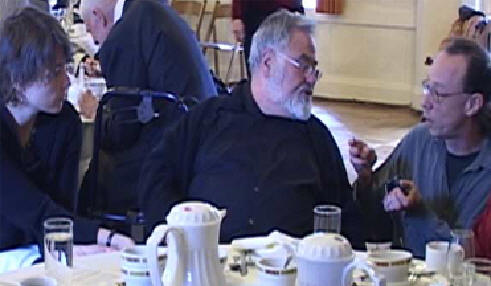
Judith, George Lakoff and Edwin in Berkeley
The Empathy Expert featured
in this issue is George Lakoff. George is Professor of Linguistics at UC
Berkeley and author of the 'The Political Mind' and many other books. He
has worked to build a culture of empathy through research, education,
and now through the political process.
Judith and I attended two of his recent talks where he was promoting the
California Democracy Act. We had a chance to sit and chat with him over
lunch and again over dinner. George agreed to do a more in-depth
interview with me in the future, so I'm looking forward to that. I video
taped both talks and they are now online.
Expert Web Page
For every expert who has created a great deal of material about empathy
on the internet, I'm putting together a separate organized web page on
them with links to their work. I've collected and organized 25 of
George's video speeches along with many articles on this page. Many of
the videos have a written outline that makes it easy to see the
contents. The sections where he talks about empathy are
highlighted for quick
access.
Check
this page to go in-depth into his work
To summarized Georges ideas as I see them: The old view of 18th century
Enlightenment Reason has been scientifically proven to be wrong, and we
need a new Enlightenment of Real Reason or an Empathic Enlightenment. A
large part of our reason is used for empathy and connecting to others
and this is supported by the discovery of mirror neurons. Empathy is the
foundation of progressive morality and the basis for democracy, caring,
fairness, responsibility, protection, equality, etc. The Obama Campaign
ran on the theme of empathy and we need to create an empathy based
movement to support these values.
California Democracy Act
George is now leading the campaign for the California Democracy Act,
with the goal of returning majority rule to budget matters in the state
of California. He says, "Democracy is about empathy - caring about your
fellow citizens, which leads to the principles of freedom and fairness
for all." At his talks, I asked him a couple of questions, here is a
summary. Click on the photos to see the full question and answer.
|
|

Berkeley, CA
(Full video, 50 min) |
|
Edwin: What is your current thinking on building an empathy-based movement?
When Obama is asked to support an initiative, he asks "where is the
movement?".
There needs to be a
movement behind each initiative.
Politicians need a
movement to get out in front of.
The movement starts with
you and me....more |
|
|
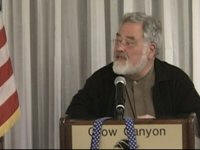
San Ramon, CA
(Full video, 53 min)) |
|
Edwin: What
is the relationship of empathy to democracy and the Californians for
Democracy Act?
Empathy is part of the description and in the literature. The best
explanation of the relationship of empathy and democracy is from Obama.
Obama says patriotism begins with citizens caring for each other....more |
|
|
|
Links

|
Jeremy Rifkin Video is now Public
|

at Sonoma |
I was finally able to make
my video, which I mentioned in the last edition, of Jeremy Rifkin pubic.
This 1 hour and 20 minute video is now online with another 1 hour video
of his talk at Google.
See them here on his Expert Page. |

at Google |
Huffington Post had a month of articles related
to the 'Empathic
Civilization'.
Here are just a few of the articles that have been posted in
the last month.
|
|
 |
|
For this month's HuffPost Book Club, I have chosen Jeremy Rifkin's
The Empathic Civilization, which boldly sets out to present
nothing less than -- as Rifkin puts it -- "a new rendering of human
history." |
|
|
 |
|
Jeremy Rifkin: When Both Faith And Reason Fail, Stepping Up To The Age
of Empathy
While our radio talk shows and 24-hour cable TV news programs
incessantly play off the political rift between conservative and liberal
ideologies, the deeper conflict in America has always been the cultural
divide between faith versus reason. |
|
|
 |
|
'Empathic
Civilization' Excerpt: Homo-Empathicus, The Big Story That Historians
Missed
The following is an excerpt from the HuffPost book club pick for
February, Jeremy Rifkin's "The Empathic Civilization". |
|
|
 |
|
Mary Gordon: Building A New World One Child At A Time
The basis for solving all of the problems we face is empathy. If
homo empathicus can get that right, we allow for the viability of
our physical and social universe. |
|
|
 |
|
Alison Gopnik: Amazing Empathic
Babies
One of the best ways of understanding human nature is to study
children...Reestablishing that sense of personal intimacy with the
"others" may be one of the best ways of bringing about global moral
change. |
|
|
 |
|
David
Elkind: How Little Minds Are Wired For Compassion
In our world today we are seeing a battle between human values (homo
empathicus) and economic values (homo averiticus). So far,
homo empathicus appears to be losing this battle. |
|
|
 |
|
Richard Restak: Our Brains Were Built For Feeling Each
Other's Pain
In our culture we're taught to think of ourselves as independent and
self-actualizing. In reality, our brain is uniquely constructed for
experiencing other people's thoughts, emotions and actions as if they
were our own. |
|
|
 |
|
Robert D. Stolorow: In an Age of Trauma
Imagine an "empathic civilization" in which the obligation to provide a
relational home for the emotional pain that is inherent to the
traumatizing impact of our finiteness has become a shared ethical
principle. |
|
|
 |
|
Jodi Halpern: Why Empathy Is Essential For Doctors And In
Conflict Resolution
When empathy is guided by a deeper understanding of each other's
perspectives, it offers enormous promise for helping us build global
cooperation. |
|
|
 |
|
|
|
|
Your Comments
 |
How are you Personally Building a Culture of Empathy and
Compassion?
Send me a note with your answer to this question and I'll post it here in
future editions.
Eric Schechter
is a frequent contributor to the
empathy cafe discussion
list.
Eric says:
I've been blogging about politics for a few years, and more recently I'm
running for Congress and writing essays about my views. In all of my blogs
about politics, I have tried to express my concern for the well being of
other people, my feelings about their feelings, the fate that we all share,
etc. I suppose that all friendly communication works to increase the
empathic bond among us all, but it does so more when the communication
includes some conscious awareness of that bond. |
|
Connect With Us |
Send me your insights,
articles and stories for the next newsletter.
Connect with us at:
Email
Website
Facebook Edwin
Rutsch
Facebook Group
Yahoo
Discussion List
Subscribe or Unsubscribe
to this Newsletter. |


























